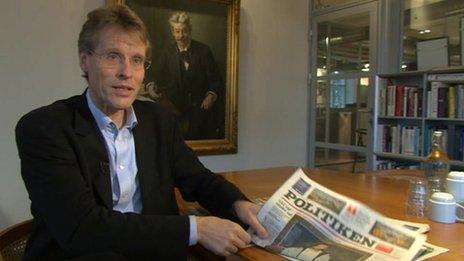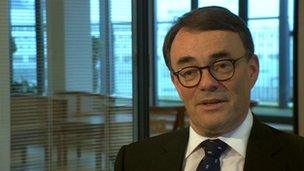UK press regulation: Lessons from Denmark?
- Published

Politiken's editor-in-chief sees the press as the guardians of regulation
As Lord Justice Leveson puts the finishing touches to his recommendations for a new method of regulating the press in Britain, could the Danish model of so-called co-regulation be an option for the UK?
It is many British newspapers' worst nightmare: A system where complaints from readers are handled by a press council set up by Act of Parliament, whose members are government-appointed, and which has the power to demand that erring titles be fined.
How can you possibly have that kind of government oversight and a free press?
Yet that's exactly what they have in Denmark, a fully functioning democracy which values press freedom highly.
What's more, Danish newspapers have enthusiastically embraced the system - while some Danish MPs say that, however draconian it may sound by British standards, it still isn't tough enough.
Britain's existing Press Complaints Commission, set up, financed and run by the newspaper industry, is due to be wound up.
The question Lord Justice Leveson is pondering is what should replace it.
Government's dirty work?
The Danish Press Council was formed in 1991 and oversees journalism, not just in newspapers but on Danish TV and radio and, increasingly, in online media.
Half its members are drawn from broadcasting, newspapers, and journalism trade unions; the rest are independent.
It is chaired by a supreme court judge. All are appointed by government.
So is it there to do the government's dirty work?
Not according to lawyer Jesper Rothe, the deputy chairman. "I am not employed by the government in any way," he says.
"The members of the council do not have any specific ties to the government and the government does not in any way try to influence us."
They are independent in the same way as judges are independent, he adds.
Bo Lidegaard, editor-in-chief of one of Denmark's leading newspapers, Politiken, agrees.
Speaking from his corner office overlooking Copenhagen's town hall square that has been occupied by Politiken editors for over a century, he says: "It is a council supported by the press itself, and it operates under rules that we collectively have established and we, the press, are basically the guardians of the system."
Denmark is a small country, with a population of 5.4 million, and the Danish Press Council is also small, with a staff of just three and a budget of £300,000 to which the newspapers are obliged to contribute, just as they are obliged to accept its rulings.
Last year it received 157 complaints about inaccuracy, and about breaches of a press code of ethics drawn up by the council which obliges journalists to respect people's privacy, lays down rules for court reporting, and requires the clear separation of advertising and editorial, among other things.

Independence is key, says press council deputy chairman Jesper Rothe
Forty-two complaints were upheld, and the offending newspapers were obliged to publish the council's findings word for word.
If a newspaper refuses the council cannot punish it directly, but can go to court to ask for the paper to be fined. That hasn't happened for at least 10 years.
But while the newspapers believe the system works well, and that going along with it helps bolster their credibility with readers, some politicians have their doubts.
They say unacceptable and inaccurate stories still get published: a nursery manager accused of complicity in paedophile abuse; a mother accused of abducting her child; a man branded a killer; a dairy accused of polluting its cream with human urine.
And earlier this year a committee of MPs accused newspapers of doing their best to bury publication of press council decisions with as little prominence as possible.
"Some of the media have said 'OK, we have to do better,'" says Mogens Jensen, a member of the committee.
"The Press Council has started to demand from the media that corrections should be on the front page or in a much more prominent position - and that change is happening now, and we are very satisfied that it is going in the right direction."
He said MPs had ruled out one option, namely allowing the council to fine errant newspapers directly: "I think if you have to pay a fine then the courts are the right place to decide that."
Complaints system
The Danish system is one of several models Lord Justice Leveson could choose from in recommending a way forward for the UK.

Other countries are also struggling to come up with a system that does not curb press freedom
He has taken evidence from the Irish press ombudsman about how the system works there, with a voluntary body set up by the newspaper industry, and papers given an incentive to sign up to the system, in the shape of preferential treatment in libel cases.
And he has also heard proposals for a strengthened system of voluntary self-regulation from the UK's Press Complaints Commission - which proposes a new body whose members sign legally enforceable contracts, to prevent newspapers simply opting out, and which has powers to levy fines up to £1m.
But other countries too are struggling with the dilemma of how to curb the worst excesses of journalists by creating a complaints system which has teeth, but without curbing the freedom of the press or giving government undue influence.
An independent inquiry in Australia earlier this year proposed a system very like the Danish, "structured to ensure that it was free from government influence".
But a subsequent review of communications legislation has suggested instead an "industry-led" body. A statutory body, it said, "should be a position of last resort".